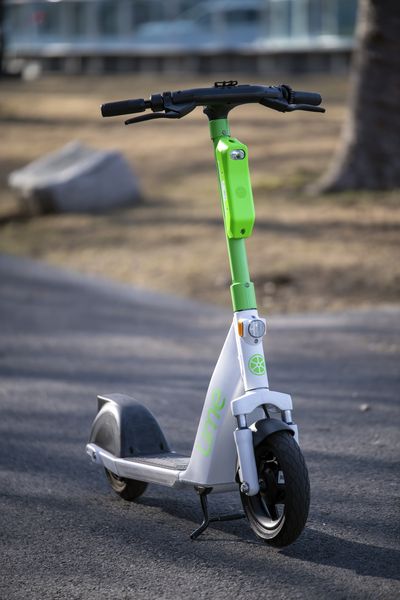A war of two scooters: Lime, Bird battle over exclusive e-bike contract in Boise

Two warring scooter companies appeared before the Boise City Council on Tuesday as both vied to be the exclusive purveyor of e-scooters and e-bikes in Idaho’s capital city.
The debate between two national companies, Lime and Bird, came after the city began requesting applications from station-less scooter and bike companies – micro-mobility vendors, as they’re sometimes called – in December.
Representatives of both companies traveled to Boise for the council meeting.
Rather than setting up a bike-share program, as Boise tried to do a few years ago, the City Council decided last year to instead look for one private vendor to provide the service. In previous years, multiple scooter vendors – including Lime and Bird – have operated in Boise, and the city has received complaints about scooter safety as well as their prevalence downtown and limited presence in other parts of the city.
During a presentation on Tuesday, Bre Brush, Mayor Lauren McLean’s transportation advisor, said the city thought it would be easier to manage a single vendor and to address issues that arise.
Boise received applications from four vendors, and eventually settled on three finalists: Lime, Spin and Bird. As is standard with government applications that go through a “request for proposal” process, the companies were ranked by a set of criteria, and the company with the highest ranking won.
In this case, that was Lime.
Bird objected to that decision and appealed it earlier this year, which resulted in Tuesday’s hearing.
In its appeal, TJ Birkel, a manager of government partnerships for Bird, said the company had been “shocked” to learn it had not been awarded the contract and had instead placed third, behind Lime and Spin, in the ranking.
Birkel argued his company has had the longest-standing commitment to Boise, including having been a multi-year sponsor of the Boise Pride Festival.
Lime, Birkel suggested, has so far had a “lack of engagement” in Boise, and that the city runs the risk of getting “broken promises” with the company. Birkel said Lime made commitments to the city – like partnering with the Idaho Women and Children’s Alliance in December – just after Boise solicited applications from companies, which Bird thought was “opportunistic.”
Birkel said he had shared letters of support for the company from the Boise Metro Chamber of Commerce, the Downtown Boise Association, the Idaho Retailers Association, the Idaho Restaurant and Lodging Association, Boise Pride and the Idaho Steelheads.
In his presentation to the council, Birkel argued the city should allow both vendors to operate, thus allowing more market competition.
In his argument, he said the city’s judges should have taken the company’s past involvement in the city into account, and some of the judges had not understood the criteria because they gave their bikes low scores.
In response, Brush, who was one of the city’s judges, said she had given Bird’s bikes a lower score because they were not able to be ridden by shorter people, and that she had not be able to safely mount their bikes.
Tessa Greegor, the Planning Department’s mobility in public spaces manager, also said judges had scored Lime higher for a number of reasons, including that it had more comprehensive plans for distributing its products widely, and the company said it would provide larger discounts for low-income residents.
Hayden Harvey, senior manager of government relations at Lime, said the company would commit to investing $12 million in micro-mobility in Boise over the next two years, adding that “900,000 miles (of rides) through your city is commitment.”
He said the company’s commitment to Boise has been “well-documented.”
“Lime is grateful this appeal is behind us so we can continue providing world class sustainable transportation options to the people of Boise,” Harvey said in a statement. “We thank the city for recognizing the work we’ve put into building our community relationships here and we look forward to building a more connected future for all Boiseans.”
Council Member Patrick Bageant asked Harvey if that dollar amount was a firm commitment, and Harvey said yes.
Council Member Colin Nash asked Harvey how much Lime would expect to profit from having an exclusive contract with the city, which Harvey said he didn’t have an answer for.
The council unanimously voted to deny Bird’s appeal, confirming the city’s decision to award the contract to Lime.
Brush said the city now plans to begin contract negotiations with Lime and hopes to have the company’s fleet of micro-mobility vehicles available by summer. The contract would be for one year, with up to four extensions, according to the request for proposal.